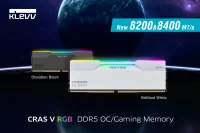(Auszug aus der Pressemitteilung)
SUNNYVALE, Calif. — June 13, 2011 – AMD (NYSE: AMD) today announced a new set of software development tools and solutions to enable developers to optimize their applications for OpenCL™ standards. These advanced tools create a foundation for software companies to realize the full potential of the AMD Fusion Family of Accelerated Processing Units (APUs), harnessing the combined compute power of AMD’s high-performance CPUs and GPUs across a wide array of heterogeneous computing platforms. As a result, developers can bring to life innovative experiences like HD video, 3D gaming, video conferencing and intuitive user interfaces, to truly differentiate their applications in the market.
“AMD is working closely with the developer community to make it easier to bring the benefits of heterogeneous computing to consumers, enabling next-generation system features like vivid video, supercomputer-like performance and enhanced battery life,” said Manju Hegde, corporate vice president, AMD Fusion Experience Program. “Our advanced developer tools and solutions enable a new era of parallel programming that’s based on industry standards and focused on delivering innovative user experiences that span a variety of computing form factors.”
Among the new offerings is the gDEBugger™ product, which was created by experts from AMD’s new Israeli research center, based on AMD’s acquisition of startup company Graphic Remedy in October 2010. gDEBugger is an advanced OpenCL and OpenGL debugger, profiler and memory analyzer. The new AMD gDEBugger release provides developers with the ability to debug OpenCL kernels running on AMD GPUs, and step through their source code while examining kernel variables and data. This product, which is a plug-in designed to work with Microsoft Visual Studio®, includes all of gDEBugger’s previous features and capabilities.
Additional developer solutions include a Parallel Path Analyzer (PPA), Global Memory for Accelerators (GMAC) and Task Manager tools, which are being developed by Multicoreware in collaboration with AMD. These new tools and solutions, expected to be available in Beta during Q3 of this year, are designed to make OpenCL GPU development easier and more efficient.
- Parallel Path Analyzer (PPA) is an advanced profiling tool for developing applications that optimize both GPU and CPU load. The PPA visualizes data transfers and kernel execution, identifies system-wide critical paths and locates data dependencies.
- The Global Memory for Accelerators (GMAC) API provides a framework in which a developer can create applications leveraging the immense compute capabilities of OpenCL, but without the overhead of having to explicitly manage multiple data buffers across the separate address spaces of GPU and CPU.
- The Task Manager API provides a framework for managing compute tasks in a heterogeneous multi-core environment. OpenCL kernels can be automatically scheduled to execute on an available and task-appropriate device, providing dynamic load balancing, optimizing use of available compute resources and removing the burden of explicit schedule handling.
The new tools expand AMD’s robust line of developer solutions that are publicly available on the AMD Developer Central website, including software development kits, libraries, compilers, webinars and educational support. In addition, developers will be able to learn more about AMD’s comprehensive set of software tools and solutions at the AMD Fusion Developer Summit taking place this week in Bellevue, Washington. Summit participants will be able to engage in interactive sessions and hands-on labs to deepen their knowledge of advanced CPU and GPU programmability.





Neueste Kommentare
26. April 2024
19. April 2024
17. April 2024
17. April 2024
5. April 2024
23. März 2024